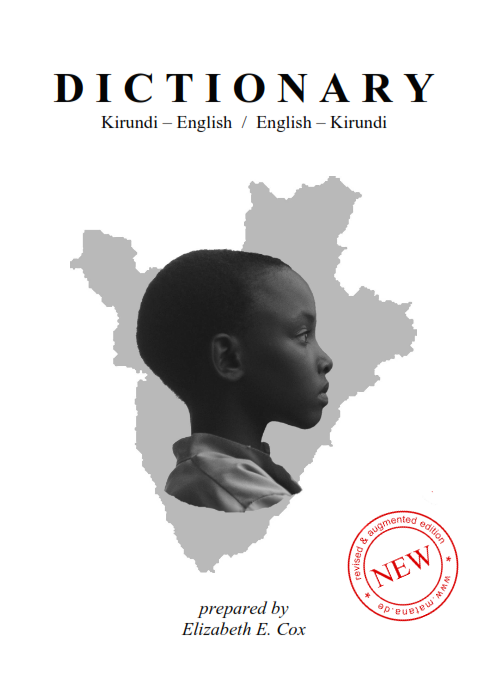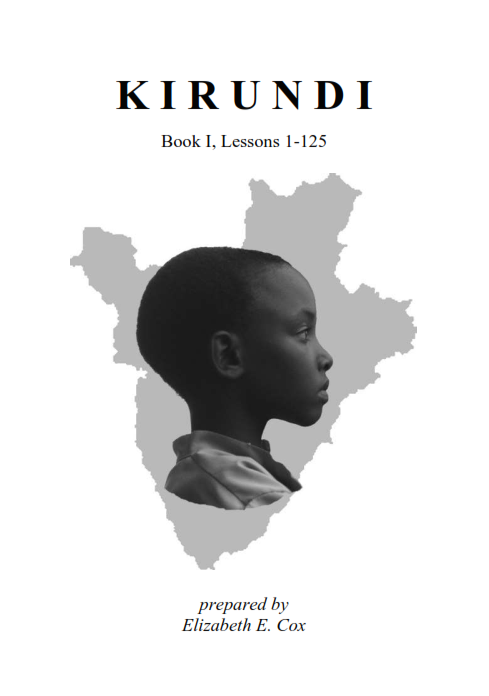left behind ▶ (things, not food, ~) amasigarira
(to get ~ as you stare at something) kurēngāra
(to be ~) gusigara
(to get ~ as you stare at something) kurēngāra
(to be ~) gusigara
En-En dictionary
eat ▶ kurya, gufungura, kunogera, kunoza, kurandagura
(a lot) guhāga, guhīmba
(cause to ~ a lot) gupfunereza
(by sucking only, as candy) kuyongobeza, kuyungubiza
(garden plants, of goats) kwōna
(to refuse to) kuzira
(to refuse to ~ or drink with) kunēna
(together) gusangira
(to ~ what's left on peeling of roasted banana, etc.) gukōra
(two kinds of food together) gukoza
(with instrument) kurīsha
(a lot) guhāga, guhīmba
(cause to ~ a lot) gupfunereza
(by sucking only, as candy) kuyongobeza, kuyungubiza
(garden plants, of goats) kwōna
(to refuse to) kuzira
(to refuse to ~ or drink with) kunēna
(together) gusangira
(to ~ what's left on peeling of roasted banana, etc.) gukōra
(two kinds of food together) gukoza
(with instrument) kurīsha
En-En dictionary
extra ▶ (additional) inyongera
(to be left over) gusigara
(~ digit, toe, teat) indorerezi
(to be left over) gusigara
(~ digit, toe, teat) indorerezi
En-En dictionary
kurekwa (-retswe) v ▶ to be left
cut ▶ (to ~) guca, gutānya, gukata (Sw.)
(to be ~) gucībwa
(banana leaves) kugombōra
(banana stalk) gutūmbūra, guhānyura
(chop with hoe or other instrument) kujema
(crosswise) kugegena
(down trees left after fire has passed over) gutōngōra
(easily) gutemuka
(easily, grass) kwāhirika
(eyes out) kunogora
(grass) gutema, gukera, gukerera
(grass for use) kwāhira
(grass or brush in order to see path or object) guhūnja
(hair) kumwa
(in big chunks) guketagura
(in even lengths) gucacūra
(in many pieces) guhimbagura
(in pieces) gukebagura
(lengthwise) kwōmānza, gusatura
(meat, finger, etc.) gukeba
(neck of animal) gukerera
(off) gukona
(off branches) gukōkōra
(off tail of animal) gukēmūra
(off top of tree) gukēmūra
(tree) gukera, gutema, guca
(trees for building) guhimbura
(up) gukekagura
(up into small pieces) gukeka
(up small as reeds, boards) gutemagura
(trees or sticks) kugegena
(with one blow) gutemura
(with sawing motion) gukerera
(wood in short bits) kunyuramwo
(wool of sheep) gukēmūra
(to be ~) gucībwa
(banana leaves) kugombōra
(banana stalk) gutūmbūra, guhānyura
(chop with hoe or other instrument) kujema
(crosswise) kugegena
(down trees left after fire has passed over) gutōngōra
(easily) gutemuka
(easily, grass) kwāhirika
(eyes out) kunogora
(grass) gutema, gukera, gukerera
(grass for use) kwāhira
(grass or brush in order to see path or object) guhūnja
(hair) kumwa
(in big chunks) guketagura
(in even lengths) gucacūra
(in many pieces) guhimbagura
(in pieces) gukebagura
(lengthwise) kwōmānza, gusatura
(meat, finger, etc.) gukeba
(neck of animal) gukerera
(off) gukona
(off branches) gukōkōra
(off tail of animal) gukēmūra
(off top of tree) gukēmūra
(tree) gukera, gutema, guca
(trees for building) guhimbura
(up) gukekagura
(up into small pieces) gukeka
(up small as reeds, boards) gutemagura
(trees or sticks) kugegena
(with one blow) gutemura
(with sawing motion) gukerera
(wood in short bits) kunyuramwo
(wool of sheep) gukēmūra
En-En dictionary
over ▶ (way over there) harīya
(not too far away) harya
(to be almost, night) gushīra, e.g. ijoro rishīra ubuca
(to be left) gusigara
(to leave) gusigaza
(left-overs) imisigazwa
(not too far away) harya
(to be almost, night) gushīra, e.g. ijoro rishīra ubuca
(to be left) gusigara
(to leave) gusigaza
(left-overs) imisigazwa
En-En dictionary
gukōra (-kōye) v ▶ 1. to eat what's left on peeling of roasted banana, etc. (gukōra ibishishwa), 2. to continually beg
stare ▶ (at) gufyura amāso, guhānga amāso, gukanaguza
(at one another) guhangana
(at without seeing) guturumbura, gutumbagura
(to get left behind as you ~ at something) kurāngāra
(at one another) guhangana
(at without seeing) guturumbura, gutumbagura
(to get left behind as you ~ at something) kurāngāra
En-En dictionary
whore ▶ marāya, indaya (Sw.)
(woman who has left many husbands and finally gone and built at parent's home) igisubiramuhira
(woman who has left many husbands and finally gone and built at parent's home) igisubiramuhira
En-En dictionary
ibāmfu 3 class 3
singular: i-,in- ▶ left hand, left side, left
singular: i-,in- ▶ left hand, left side, left
ibubāmfu n ▶ left hand, left side, left
ububāmfu 8 class 8
singular: ubu- ▶ left hand, left side, left
singular: ubu- ▶ left hand, left side, left
ukubāmfu 9 class 9
singular: uku- ▶ left hand, left side, left
singular: uku- ▶ left hand, left side, left
gusigwa (-sizwe) v ▶ to be left
behind ▶ inyuma
(get left ~ as you stare at something) kurāngāra
(to hide ~) kwīkīnga
(to leave) gusiga
(to look) gukebuka
(get left ~ as you stare at something) kurāngāra
(to hide ~) kwīkīnga
(to leave) gusiga
(to look) gukebuka
En-En dictionary
gusigara (-sigaye) v ▶ to be left over
gusigaza (-sigaje) v ▶ to leave over, to leave a part of something, to cause to be left
kwōkōka (-ōkōtse) v ▶ 1. to be left alive after a plague, 2. to survive, 3. to regain health or possessions
gucāguka (-cāgutse) v ▶ 1. to be left over, 2. to be more than enough
gusigazwa (-sigajwe) v ▶ to be kept over, left over
gutōngōra (-tōngōye) v ▶ 1. to consume (fire), 2. to take away completely, 3. to cut down trees left after fire has passed over
kugishūra (-gishūye) v ▶ 1. to take a thing home from where you've left or put it, 2. to take cows home after being away a long time to pasture
kurāngāra (-rāngāye) v ▶ to be empty, be wide open, to get left behind as you stare at something
kurēngāra (-rēngāze) v ▶ to get left behind (as you stare at something)
strength ▶ imbaraga, inkomezi, ubukomezi
(muscular) intege
(physical) amagara
(my ~ has left me) amagara yandyarutse
(to regain) guhembūka
(muscular) intege
(physical) amagara
(my ~ has left me) amagara yandyarutse
(to regain) guhembūka
En-En dictionary
inkogoto (in-) 3 class 3
singular: i-,in-
plural: i-,in- ▶ scar left by person scratching or biting another
singular: i-,in-
plural: i-,in- ▶ scar left by person scratching or biting another
kuryārukana (-ryārukanye) v ▶ to abuse one you formerly loved
(amagara yandyarutse – my strength has left me)
(amagara yandyarutse – my strength has left me)
amagara yandyarutse phr ▶ my strength has left me (from kuryārukana)
woman ▶ (lit. one wearing a wrap skirt) umukenyezi
(married ~) umugore
(lady-like, respected) umupfasoni
(elderly, respectful term) umukamakare
(elderly, disrespectful term) umukēcuru
(who has left many husbands and finally goe's to parent's home to build) igisubiramuhira
(married ~) umugore
(lady-like, respected) umupfasoni
(elderly, respectful term) umukamakare
(elderly, disrespectful term) umukēcuru
(who has left many husbands and finally goe's to parent's home to build) igisubiramuhira
En-En dictionary
amasigarira 5 ▶ things left behind (not food)
igisubiramuhira (ibi-) 4 class 4
singular: iki-,ic-
plural: ibi-,ivy- ▶ woman who has left many husbands and gone home and finally builds at parent's home (same for a man)
singular: iki-,ic-
plural: ibi-,ivy- ▶ woman who has left many husbands and gone home and finally builds at parent's home (same for a man)
imisigazwa 2 ▶ left overs
ubumoso 8 class 8
singular: ubu- ▶ left hand or side
singular: ubu- ▶ left hand or side
umuza (imi-) 2 class 2
singular: umu-
plural: imi- ▶ line of cream left on sides of container
singular: umu-
plural: imi- ▶ line of cream left on sides of container
arm ▶ ukuboko, ukuboke
(upper) ikizigira
(left ~) ukuboko kw'ibubamfu, ukubamfu
(right ~) ukuboko kw'iburyo, ukuryo
(to raise one's ~, to strike, to pull a bow) kubangurira
(to stretch out) kurāmvura
(to take a child in ~) kurera, gukīkira
(upper) ikizigira
(left ~) ukuboko kw'ibubamfu, ukubamfu
(right ~) ukuboko kw'iburyo, ukuryo
(to raise one's ~, to strike, to pull a bow) kubangurira
(to stretch out) kurāmvura
(to take a child in ~) kurera, gukīkira
En-En dictionary
get ▶ kuronka, guhabwa
(angry, suddenly when one has been talking nicely) kugangabuka
(big, skin in water) kubōmbōka
(close together) kwegerana
(dark, late) kwīra
(dirty) kwāndura
(food for oneself) gutāra
(~ out of the car) kuva mu modoka, gusohoka mu modoka
(~ out of my way!) have! vaho!
(~ out of there) have, vaho
(left behind as you stare at something) kurēngāra
(something in eye) gutosekara
(thin) kugeruka
(thin, very) kugōgōra
(up) guhaguruka, kuvyūka
(up, quickly) kubaduka
(up, to help another ~) kuvyūra
(angry, suddenly when one has been talking nicely) kugangabuka
(big, skin in water) kubōmbōka
(close together) kwegerana
(dark, late) kwīra
(dirty) kwāndura
(food for oneself) gutāra
(~ out of the car) kuva mu modoka, gusohoka mu modoka
(~ out of my way!) have! vaho!
(~ out of there) have, vaho
(left behind as you stare at something) kurēngāra
(something in eye) gutosekara
(thin) kugeruka
(thin, very) kugōgōra
(up) guhaguruka, kuvyūka
(up, quickly) kubaduka
(up, to help another ~) kuvyūra
En-En dictionary
scar ▶ inkovu
(from medical cutting) ururāsago, indāsago
(left by person scratching or biting another) inkogote
(on gourd or skin) umuguma
(of plant) ibango
(from medical cutting) ururāsago, indāsago
(left by person scratching or biting another) inkogote
(on gourd or skin) umuguma
(of plant) ibango
En-En dictionary
left found in: Kirundi I (Study lessons)
lesson 85 ▶ Passives of Monosyllabic Verbs
lesson 89 ▶ Not Yet Tense
left found in: Kirundi II (Grammar)
chapter 7 ▶ “never-yet” Tenses
chapter 9 ▶ “immediately”
chapter 55 ▶ jeho, weho, etc.











 printable PDF files.
printable PDF files.

 This unique dictionary by Betty Cox is known for the deep cultural insight it provides to many Kirundi terms. It has been thouroughly revised, adapted to present-day Kirundi orthography rules and many new words and meanings have been added.
This unique dictionary by Betty Cox is known for the deep cultural insight it provides to many Kirundi terms. It has been thouroughly revised, adapted to present-day Kirundi orthography rules and many new words and meanings have been added. The Kirundi self study course guides you through 125 lessons and makes you learn both the necessary vocabulary and basic grammar.
The Kirundi self study course guides you through 125 lessons and makes you learn both the necessary vocabulary and basic grammar. English pronunciation by
English pronunciation by


